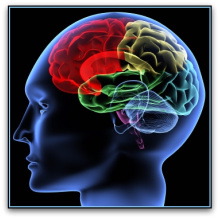
Some individuals who seek the services of clinical psychologists aren’t exactly sure what is causing their problems or affecting their lives, they just know that things aren’t going well, that marriages or relationships are suffering, that, for some reason, depression, anxiety or a number of other conditions have affected either their behaviors, or the behaviors of those they love.
But in some cases, physicians know that certain issues and problems are a direct result of a brain disorder caused either by injury, disease, or developmental dysfunctions. And for these individuals, a specialized form of clinical psychology called clinical neuropsychology focuses on treating those with known structural and functional brain malfunctions.
Clinical neuropsychologists are the professionals who treat neurological patients, often referred to them by neurologists, other physicians, other psychologists, or social agencies. In most cases, the patient exhibits cognitive and behavioral dysfunctions related to a brain injury or disease, and the referring doctor or agency seeks to gather information critical to the patient’s rehabilitation.
But in certain cases, such as those of developmental disorders, the clinical neuropsychologist often is consulted to help identify developmental learning disorders, such as dyslexia, attention deficit disorder, and nonverbal disability. Parents, an educational facility or social service agency has already determined that the child’s cognition and behaviors suggest a form of brain disorder, and the clinical neuropsychologist helps to accurately assess and diagnose the disorder.
A Clinical Approach
Clinical neuropsychologists consult with patients and their families in healthcare settings, such as hospitals or medical clinics, or in clinical neuropsychology practices. They also see some children in educational settings.
The referring physician gives clinical neuropsychologists the results from neuroimaging tests, such as CT or (computerized tomography) MRIs, (magnetic resonance imaging) and PETs (positron emission tomography).
These tests pinpoint structural brain injuries or tumors within millimeters in the brain, localizing brain dysfunction to specific areas and regions of the brain. Physicians also forward the patient’s other medical records and results from laboratory tests to a clinical neuropsychologist to provide a complete case history of the patient.
The referring doctor or agency also develops a question or set of concerns about the patient’s cognitive and/or behavioral deficits that must be addressed in order to plan rehabilitative services and interventions. These concerns often involve answering specific “everyday functioning” issues, such as the ability of the patient to drive, independently take care of personal hygiene, finances, and work-related issues.
During the initial examination, the clinical neuropsychologist interviews the patient as well as any family members that are present, asking about the patient’s history and the patient’s opinion of the nature of the brain injury or deficit. Through this initial interview, the clinical neuropsychologist determines the patient’s awareness of problems, and his or her physical capacity and mental ability to undertake a more in-depth neuropsychological assessment consisting of a series of tests.
If the patient is able to sit through and perform a number of cognitive tests, the clinical neuropsychologist assigns a trained technician to administer the tests.
The Clinical Assessment
After the initial interview, the clinical neuropsychologist also develops a hypothesis about the level and depth of cognitive and behavioral impairment. Keeping in mind the rehabilitative concerns and questions of the referring doctor, and synthesizing the results from the other medical tests and the patient’s history, the clinical neuropsychologist recommends either a series of neuropsychological tests, or a shortened subset of one or more tests depending on the patient’s abilities and needs.
Many valid and reliable neuropsychological tests have been developed over the years designed to assess all areas of cognitive functioning, including:
- Intellectual function
- Memory
- Speech and language
- Visual perception
- Psychomotor/Psychosensory functions
- Planning, judgment, decision-making functions
- Attention
While a technician administers neuropsychological tests, the clinical neuropsychologist assesses the results. Based on the outcomes, the clinical neuropsychologist recommends rehabilitation plans, interventions, a plan to return to work, recommendations for daily living, or any other issues requested by physicians and healthcare personnel.
Monitoring
The neuropsychological tests give psychologists and physicians not only a snapshot of current cognitive and behavioral functioning, but they also provide a baseline – an important element in any rehabilitation program. Periodic re-testing gives both healthcare providers and psychologists a chance to evaluate the success of a particular rehabilitation program or treatment, and to gauge the patient’s progress toward stated goals.
Serial testing also gives clinical neuropsychologists valuable information concerning the efficacy of a particular drug used for diseases, such as Parkinson’s disease or seizure disorders. And, for patients initially diagnosed with mild dementia, a baseline test followed by periodic re-testing provides important information regarding the disease’s progression.
Legal Situations
Attorneys and the courts also hire clinical neuropsychologists. Brain injuries resulting from car accidents, exposure to toxic chemicals, carbon monoxide poisoning, electrical or other forms of construction injuries, often end up in the courts to determine monetary settlements to the plaintiff. And in many of cases of accidental injury, brain dysfunction isn’t apparent through neuroimaging techniques or on an EEG.
Data gathered from neuropsychological tests in addition to the interview with the client that the clinical neuropsychologist conducts often provide the essential data for the courts to decide these complex cases.
Careers in Clinical Neuropsychology
If you are interested in becoming a clinical neuropsychologist, in treating individuals suffering from brain dysfunctions, contact psychology schools. Most positions in this field require a Ph.D.
Additionally, most clinical neuropsychologists must have certification by the American board of Clinical Neuropsychology (ABCN) or the American Academy of Clinical Neuropsychology (AACN). Many clinical positions also require psychologist licensure.
Other Careers in Neuropsychology
- Cognitive Neuropsychologist
- Developmental Cognitive Neuropsychologist
- University teaching and research
- School Neuropsychology Consultation
- Neuropsychology researcher for public and private organizations
- Neurogenetics Psychologist
- Neuropathology Specialist
- Behavioral Neuropsychologist
- Forensic Neuropsychologist
- Rehabilitation Neuropsychologist
- Dementia Neuropsychologist